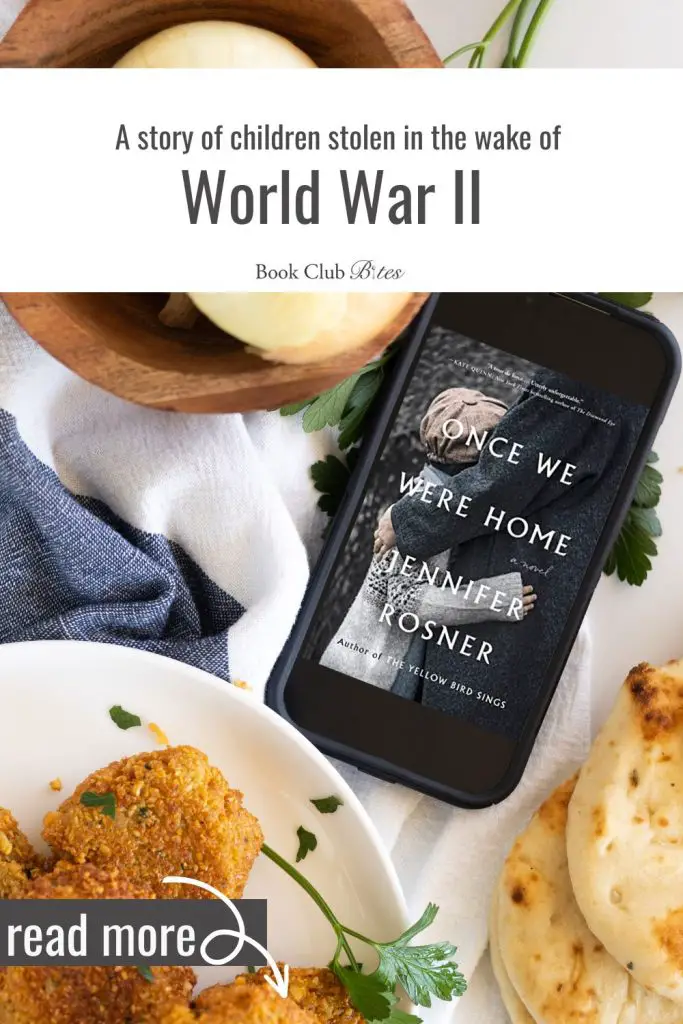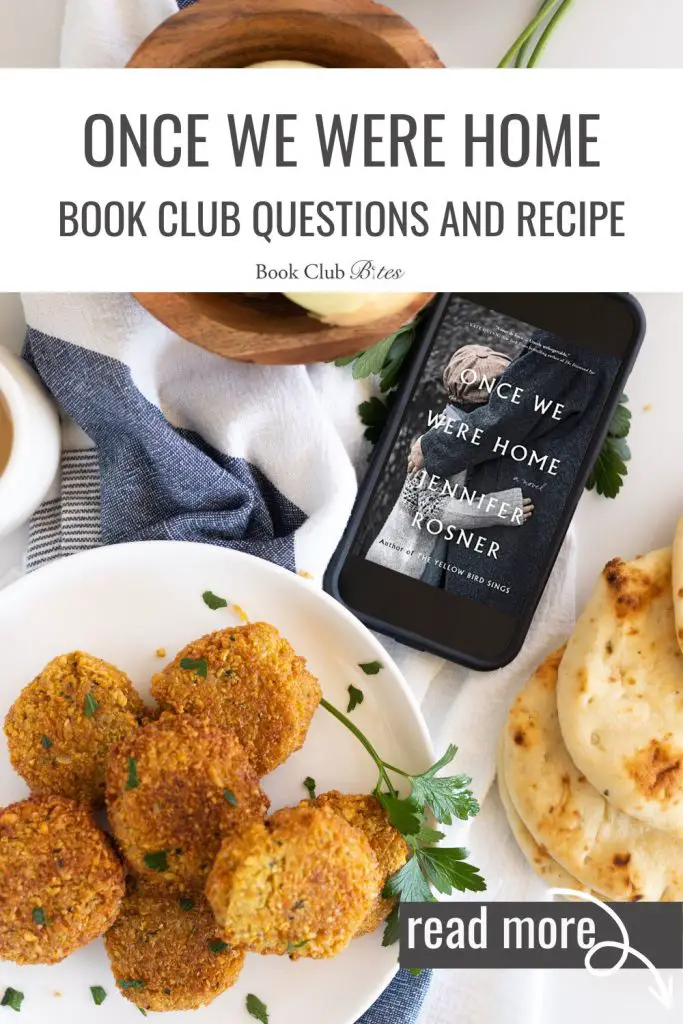*If you are new here, WELCOME! For Once We Were Home, I provide your book club with a brief summary, food ideas and a recipe, and discussion questions in that order!
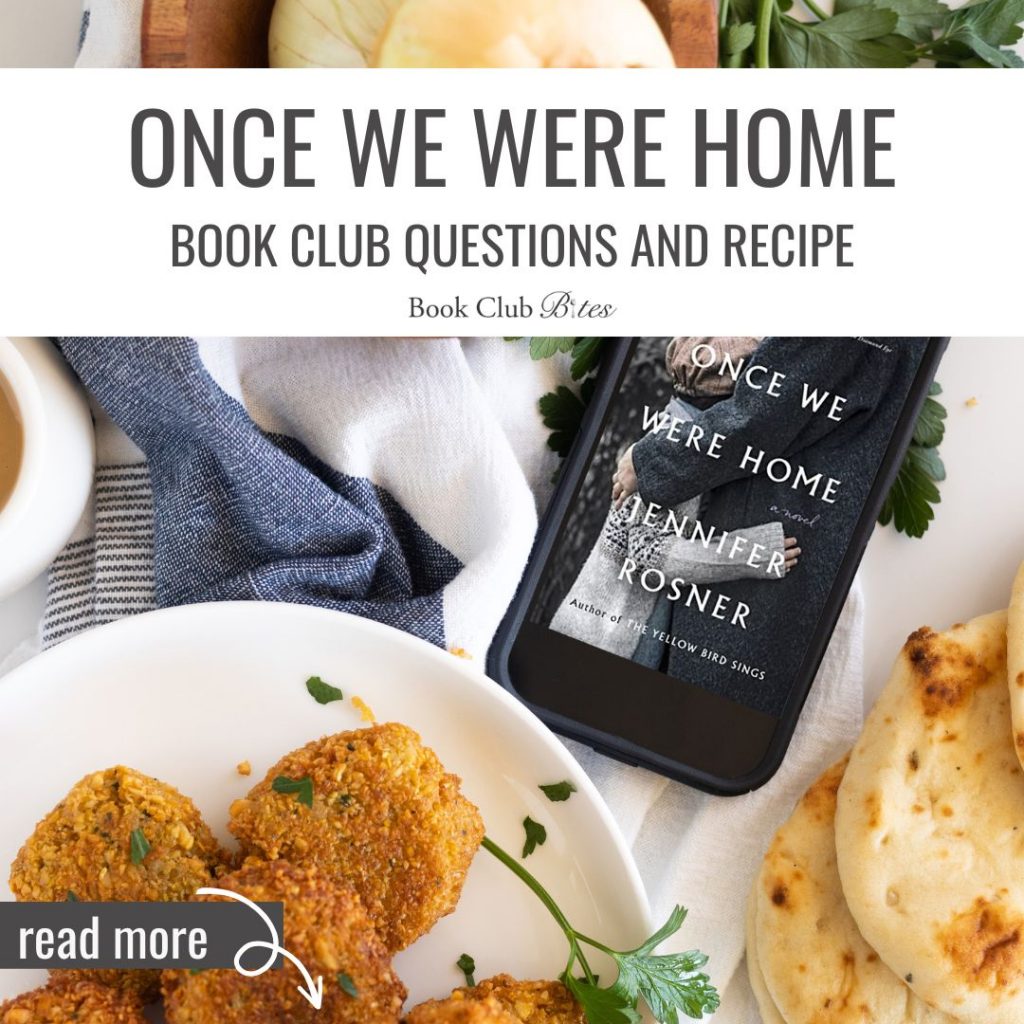
Once We Were Home is Jennifer Rosner’s newest novel. Her first, The Yellow Bird Sings, was a National Jewish Book Award Finalist.
Once We Were Home is beautiful, moving story about the Jewish children who were displaced during the Holocaust and never returned to family. It is a little-explored area of WWII fiction. Delving into the definition of family, identity and heritage, and ultimately themes of forgiveness and peace, there is plenty to talk about for your book club.
Based on true events, the novel follows three stories until they intersect for surprising reasons.
If you love WWII fiction, you’ll likely love this heartwarming, but also heart-wrenching story about the young lives affected by decisions outside of their control.
Once We Were Home is a novel chosen through Book Club Bites’ collaboration with The Best of Women’s Fiction podcast. Don’t forget to check out the fabulous Best of Women’s Fiction podcast where Jennifer Rosner discusses Once We Were Home and more: HERE.
I’ve provided book club questions and delicious food ideas for Once We Were Home and Jennifer Rosner has a special recipe for you! So if you are looking for book club ideas and more, keep reading!

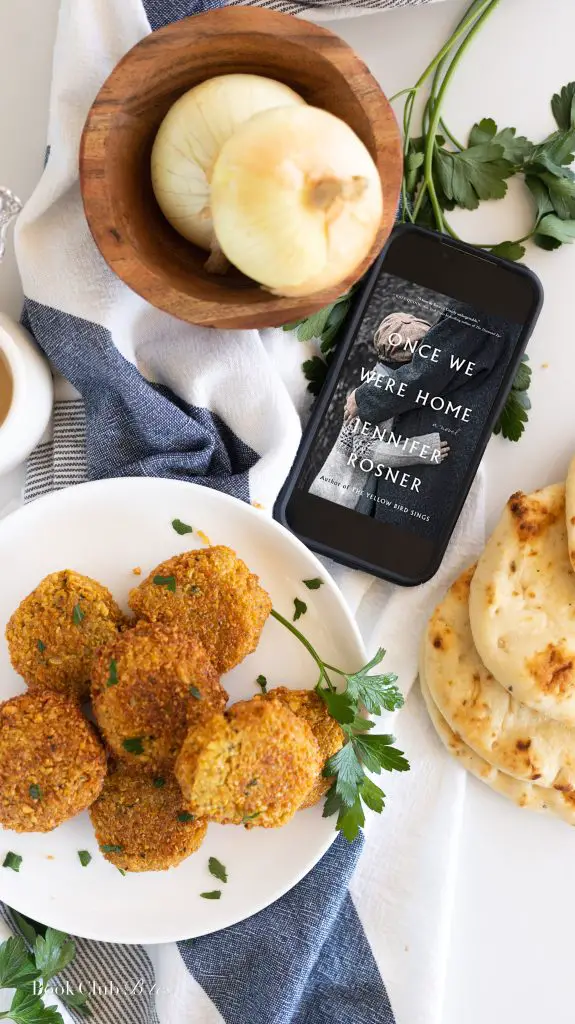
Here’s a brief summary of Once We Were Home:
From the publisher:
When your past is stolen, where do you belong?
Ana will never forget her mother’s face when she and her baby brother, Oskar, were sent out of their Polish ghetto and into the arms of a Christian friend. For Oskar, though, their new family is the only one he remembers. When a woman from a Jewish reclamation organization seizes them, believing she has their best interest at heart, Ana sees an opportunity to reconnect with her roots, while Oskar sees only the loss of the home he loves.
Roger grows up in a monastery in France, inventing stories and trading riddles with his best friend in a life of quiet concealment. When a relative seeks to retrieve him, the Church steals him across the Pyrenees before relinquishing him to family in Jerusalem.
Renata, a post-graduate student in archaeology, has spent her life unearthing secrets from the past–except for her own. After her mother’s death, Renata’s grief is entwined with all the questions her mother left unanswered, including why they fled Germany so quickly when Renata was a little girl.
Two decades later, they are each building lives for themselves, trying to move on from the trauma and loss that haunts them. But as their stories converge in Israel, in unexpected ways, they must each ask where and to whom they truly belong.
Beautifully evocative and tender, filled with both luminosity and anguish, Once We Were Home reveals a little-known history. Based on the true stories of children stolen during wartime, this heart-wrenching novel raises questions of complicity and responsibility, belonging and identity, good intentions and unforeseen consequences, as it confronts what it really means to find home.
For Once We Were Home Food Ideas:
Jennifer Rosner was kind enough to research and provide us with her favorite falafel recipe! A food widely served in Israel, where part of the novel takes place, its a great pick.
Jennifer’s recipe is modified from a Tori Avey recipe. Tori runs an extremely popular blog featuring Mediterrean and Jewish foods, so if you’d like to try a different Jewish food (or several), check out her blog!
For more food ideas, keep reading to see the foods that inspired Jennifer Rosner while writing the novel! They all sound DELICIOUS!
Whether you choose something from this list or try your own option, I hope these ideas will get your creative juices flowing to host your book club for Once We Were Home.
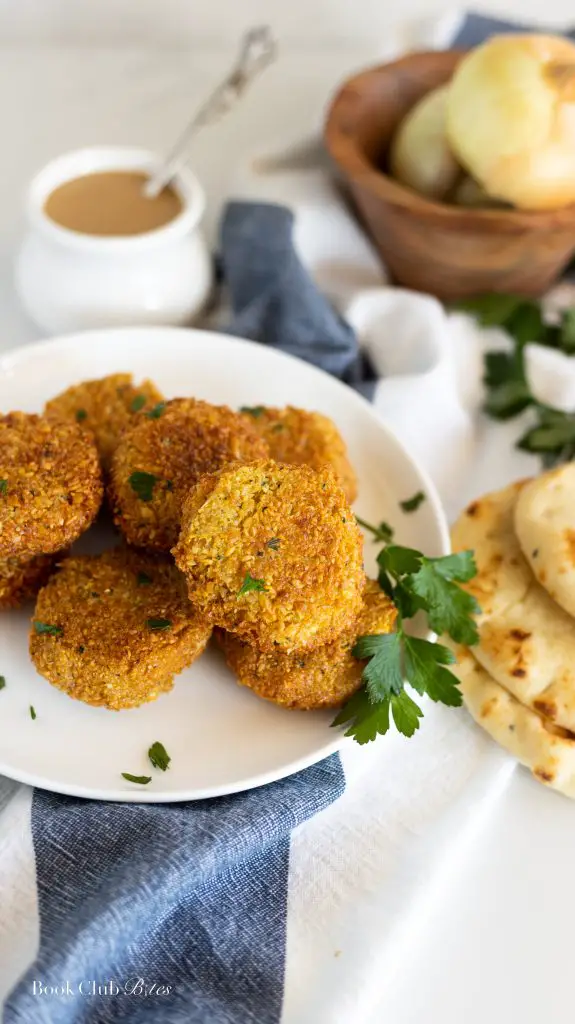
Once We Were Home Book Club Recipe:
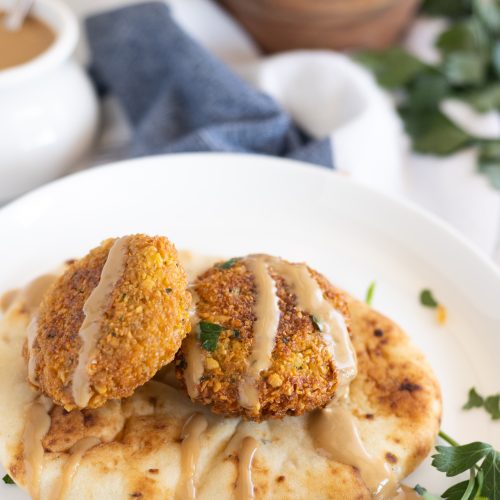
FALAFEL
Ingredients
- 1 pound dry chickpeas (garbanzo beans)
- 1/2 teaspoon baking soda
- 1 small onion chopped
- 1/4 cup chopped fresh parsley
- 3-5 cloves garlic
- 1 1/2 tablespoon flour
- 1 3/4 teaspoon salt
- 2 teaspoon cumin
- 1 teaspoon ground coriander
- 1/4 teaspoon black pepper
- 1/4 teaspoon cayenne pepper
- Pinch of ground cardamom
- 1 teaspoon baking powder optional – makes the falafel more fluffy
- Vegetable oil for frying grapeseed oil, sunflower oil, canola oil, and peanut oil work well
Instructions
- ONE DAY AHEAD:
- Pour the dry chickpeas into a large bowl and pour cold water over them until covered by 3 inches of water. Add 1/2 tsp of baking soda to the water to soften the chickpeas. Cover the bowl and soak overnight, approximately 12 hours or longer. They will double in size.
- THE DAY OF:
- Drain and rinse the chickpeas. Place them in a food processor along with the chopped onion, garlic cloves, parsley, flour, salt, cumin, ground coriander, black pepper, cayenne pepper, and cardamom.
- Pulse until a rough, coarse meal (between couscous and a paste) forms and the texture holds together. Don't over-process and make sure there is an even texture.
- Pour into a bowl and stir. Remove any large chickpea chunks. Cover the bowl and refrigerate for 1-2 hours.
- In a skillet, add 1 ½ inches of oil. Use cooking oil with a high smoke point. Heat the oil slowly over medium heat. The ideal temperature is between 360 and 375 degrees F.
- Form 2 tbsp of falafel mixture into round balls using wet hands or a scoop. (Note: if the balls don't hold together, put back into the processor and pulse until more of a paste. Try adding 2-3 tbsp of flour to the mixture. If they still won't hold, add 1-2 eggs to the mix.)
- Fry the falafels in batches until golden brown on both sides. If the oil is too hot, the falafel will brown too quickly and not cook in the center. The falafel should brown to a deep golden brown, usually around 3-4 minutes on each side. Once fried, remove them with a slotted spoon and let drain on paper towels.
- Serve fresh and hot; they go best with a plate of hummus, topped with tahini sauce, or inside a pita pocket. Enjoy!
Notes
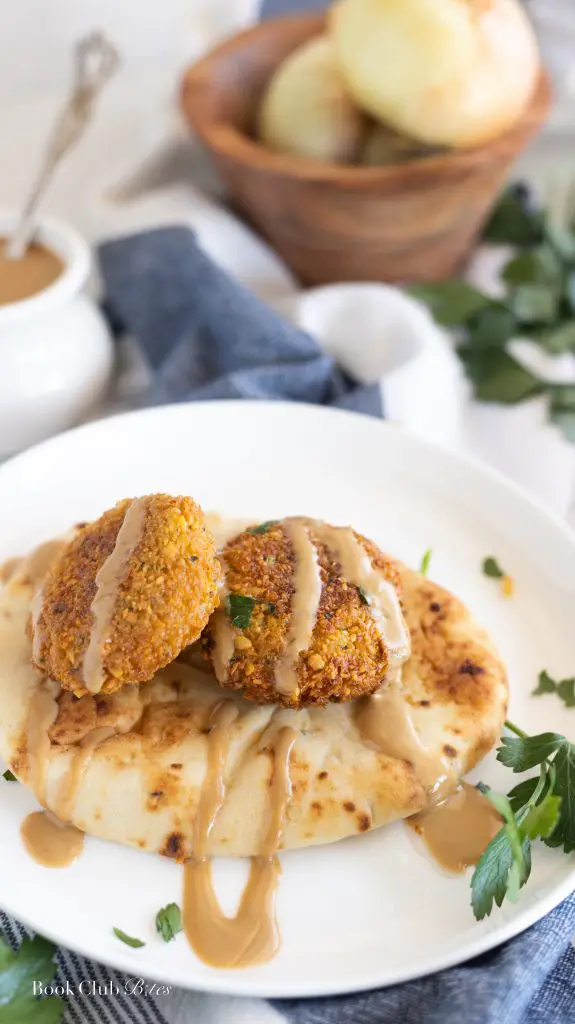
More Fun from Jennifer Rosner:
Please insert a short description of your recipe and why it relates to your novel. Include any information you think readers would enjoy!
In my novel, a team of Oxford-based archaeologists working in Jerusalem taste falafel from every local vendor they can find, trying to discover the best. (Turns out, they’re all quite delicious!)
If you would like to credit someone besides yourself for the recipe, please do so here.
This recipe is borrowed/modified from Tori Avey!
Good food and a good book go hand-in-hand. What is your favorite food to enjoy while reading?
I love to read with a steaming mug of mango tea and a handful of dark chocolate apricots!
Did you sample any interesting food while researching this book? Or experience anything exciting while researching?
I ate delicious food while doing research in Israel — falafel, shakshuka, and a new discovery: knafeh, which is a dessert made with layers of melted goat cheese, shredded filo dough, pistachios, and rose water.
Once We Were Home Book Club Questions:
*WARNING: May contain spoilers!
These book club questions were kindly provided by the author and/or publisher. Please use only for your book club and do not reproduce them.
- Discuss the title. What does the phrase “once we were home” mean to you? How does the idea of home shape the four central characters?
- With each new chapter, we alternate between the perspectives of Roger, Ana, Oskar, and Renata. How are their world views similar and different? Why do you think the author made this narrative choice, and how did it affect your reading experience?
- Did you have a favorite main character? If so, why did you connect to them more powerfully?
- How is Israel portrayed in the novel? Did anything about its characterization surprise you? What does Israel represent for each of the main characters?
- How did you interpret the short, italicized sections of the novel told from the perspective of the nesting doll? Were you surprised by what they revealed? Although they specifically tell Renata’s backstory, did you find resonances with the experiences of the other main characters? Why do you think the author decided to include these sections?
- Discuss the very different ways in which Ana and Oskar react to being taken away from the Dąbrowskis. How does that experience shape their relationship in the decades that follow? Why do they struggle to connect with each other, and what ultimately brings them together?
- How do you understand Eva’s work? What motivates her? Do you sympathize with her actions, especially in the case of Oskar and Ana?
- Beginning in boyhood, Roger is drawn to riddles, and he goes on to become a philosophy professor. Why do you think he spends his life asking these big questions about identity and belonging? Were you especially drawn to any of his inquiries in particular?
- Ana is knocked off course by the revelation that she was adopted and may not even be Jewish. As she reflects on the four women who took on mother roles in her life—Elżbieta, Chana, Agata, and Eva—she reflects: “No one ever kept hold of me.” Why does the news have such a strong effect on her? How does it change the way she thinks of her own role as a mother? What gets her back on course?
- Shmuel, the owner of the shop where Oskar works, tells him: “what is a mother if not a nesting box?” What do you think he means? How do you understand Oskar’s preoccupation with carving nesting boxes? How is his relationship to his mother figures similar and different to Ana’s?
- While we meet Roger, Ana, and Oskar early in their lives, when they are young children, Renata’s storyline begins decades later, when she’s in her 20s. Why do you think the author made this structural choice? Did it have an impact on your understanding of Renata’s character?
- Why does Roger have such a hard time grappling with Renata’s apparent German heritage? Do you sympathize with his initial decision to break things off with her? What ultimately draws them together again?
- Do you think Renata will ever find out the truth about her childhood and her birth parents, in the way that Ana did? How might that information change Renata’s life? Do you think it’s important to have that kind of knowledge about yourself? Why or why not?
- Were you aware of the historical events that inspired this novel, namely the post-war efforts to reclaim Jewish children for Israel; the Church’s efforts to keep hold of the Jewish children it harbored; and the kidnapping of non-Jewish, Aryan-looking children to be given to Nazi families during World War II?
- Discuss the ways in which Oskar and Ana’s experiences reveal the complexities of the Jewish child reclamation effort, and how it could both help and harm children. Do you see these issues as black and white, or would you argue there are moral shades of gray?
- For pious Christians, keeping Roger in the Church would mean his salvation. Can you understand the viewpoint that would lead papal authorities to hide Roger from his relatives?
- What do each of the characters wish for at the end of the novel, in front of the Western Wall? What do you think the future holds for them?
Find Jennifer Rosner:
Jennifer can be found online!
https://www.instagram.com/jennifer.amy.rosner/
https://www.facebook.com/jennifer.rosner.12
https://www.jennifer-rosner.com/
Don’t forget to check out the fabulous Best of Women’s Fiction podcast where Jennifer Rosner discusses Once We Were Home and more: HERE.
Have you read Once We Were Home? What did you think? Did it satisfy you or were you left wishing for more? What are some similar books you’ve read?
Until next time, Happy Reading!
Disclosure: This page contains affiliate links. In the event of a sale, I will be awarded a small commission (at no extra cost to you or the featured book’s author). All opinions are 100% mine and every book, unless otherwise noted, is handpicked by me to be featured on the site.
Bookish gifts for you or your reader friends!



